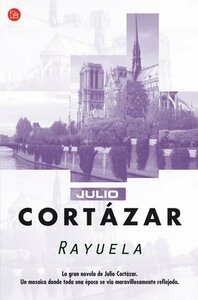Take a photo of a barcode or cover
challenging
dark
emotional
reflective
tense
slow-paced
Plot or Character Driven:
Character
Strong character development:
No
Loveable characters:
No
Diverse cast of characters:
Complicated
Flaws of characters a main focus:
Yes

Julio Cortázar's 1963 novel, Hopscotch, encapsulates much of the spirit found in his 1962 work, Cronopios and Famas. Indeed, it feels as though those freedom-loving, game-playing, frolicking Cronopios have transformed themselves into the very blood cells coursing through the veins and arteries of main character, Horacio Oliveira. He comprehends that life is a game to be enjoyed, rather than an unending drudgery to be endured. Keep it up, Oliveira! Don't let any dull, uptight Famas hold you down. Maintain those Cronopios blood cells in optimal condition by consistently infusing life with renewed freshness.
The language sizzles, crackles, sparkles, and dances the tango as a reader hops from chapter to chapter via Julio's Table of Instructions or reads in the normal fashion ending with chapter 56 (also per the instructions), or continues to read to the last page at the end of chapter 155, or any other hopscotching way you would like. However, one thing is constant: Oliveira constantly proves himself a true Cronopio, when he proclaims, one of many such proclamations, "I realized that searching was my symbol, the emblem of those who go out at night with nothing in mind, the motives of a destroyer of compasses."
Hopscotch weighs in at 564-pages, brilliantly translated by the great Gregory Rabassa and features a plot set first in Paris and then in Buenos Aires. Yet, how central is plot? After all, La Maga tells Horacio, “You think that you're in this room, but you're not. You're looking at the room, you're not in the room.” This not-being-all-there hearkens back to Julio (so much like Horacio) starting out as a child carrying an adult inside and then, with age, an adult carrying a child inside. Doing the Julio-flip! In Julio's own words taken from his Around the Day in Eighty Worlds:
“I will always be a child in many ways, but one of those children who from the beginning carries within him an adult, so when the little monster becomes an adult he carries in turn a child inside and, nel mezzo del camino, yields to the seldom peaceful coexistence of at least two outlooks onto the world. Much of what I have written falls into the category of eccentricity, because I have never admitted a clear distinction between living and writing; if in my life I have managed to disguise an only partial participation in my circumstances. I still cannot deny that eccentricity in what I write, since I write precisely because I am only half there or not there at all.”
By my reading of Hopscotch, we are well to keep Julio's not-half-or-not-all-there-at-all in mind when hopscotching on characters and themes when reading either in the conventional page after page way or turning back and forth through pages using our own or Julio's sequence. Sure, there's order vs. chaos and Oliveira vs. society and Oliveira vs. the outside world; however, by my judgement, the ultimate lens of this vs. that is the world of Cronopios vs. the world of Famas, that is, the otherworldly world of lit, art and imagination vs. the all-here world of rigidity, conformity and the drab ho-hum.
My somewhat reckless rec: read Hopscotch like a Cronopio.

Now that it's 2023, here's how I picture beautiful La Maga

Julio Cortázar, 1914-1984
challenging
dark
emotional
mysterious
reflective
sad
slow-paced
Plot or Character Driven:
Character
Strong character development:
Yes
Loveable characters:
Complicated
Diverse cast of characters:
Yes
Flaws of characters a main focus:
Yes
Had I read this in college, I would’ve loved it. For enjoyment, it felt like more of a confused slog.
Me falta leer la otra forma de leerlo pero por el momento me da hueva entonces lo voy a marcar como leido ok? ok
Read 1-56. Need to do the full order starting with chapter 73 at some point soon.
reflective
slow-paced
challenging
emotional
reflective
sad
slow-paced
Plot or Character Driven:
Character
Strong character development:
No
Loveable characters:
Complicated
Diverse cast of characters:
Complicated
Flaws of characters a main focus:
Yes
challenging
Loveable characters:
No
Diverse cast of characters:
No
Flaws of characters a main focus:
Yes
Final review, after a second, full-length, fully "hopscotching" read:
I understand why this is often lauded as a great book. The novelty and experimental style are intriguing. The multi-layered structure is impressive. The references and philosophy could keep me occupied for ages.
But I don't think it's a particularly good book. It takes so much work to read that I only rarely succeeded in immersing myself in its schizophrenic flow. The characters are all insufferable, and I can't say I enjoyed the experience.
Earlier, provisional review:
I have finished one version of this book, but can't yet say what I think of it.
All I can tell for now is that it was only partially comprehensible (that is mostly a bad thing) but that parts of it are nagging at my brain, and won't quite let go (that's probably a good sign).
There's not much point in describing what the book is "about". The few stepping stones that could be called a plot are almost completely submerged under the meandering stream-of-consciousness writing that blends description, interior monologue, and fragmentary conversations. It's the kind of book that rewards a re-reading because you'll get twice as much out of it the second time around -- as long as you don't mind that you've only gone from 20% to 40% comprehension.
Conveniently, the book gives explicit instructions for that re-read. One pass is to be linear, through the first half of the book or so. (That's what I have just completed.) Another pass is to hop around in a prescribed order, interleaving various "expendable" chapters between the chapters in the first half.
I'm hoping that the extra chapters will add some structure and fill in some gaps in the action. But this doesn't seem like that kind of book. It seems more likely that it will just add another layer of confusion, stepping the digressions up another notch.
I'm quite ambivalent about my second dive into this one: both eager and apprehensive.
I understand why this is often lauded as a great book. The novelty and experimental style are intriguing. The multi-layered structure is impressive. The references and philosophy could keep me occupied for ages.
But I don't think it's a particularly good book. It takes so much work to read that I only rarely succeeded in immersing myself in its schizophrenic flow. The characters are all insufferable, and I can't say I enjoyed the experience.
Earlier, provisional review:
I have finished one version of this book, but can't yet say what I think of it.
All I can tell for now is that it was only partially comprehensible (that is mostly a bad thing) but that parts of it are nagging at my brain, and won't quite let go (that's probably a good sign).
There's not much point in describing what the book is "about". The few stepping stones that could be called a plot are almost completely submerged under the meandering stream-of-consciousness writing that blends description, interior monologue, and fragmentary conversations. It's the kind of book that rewards a re-reading because you'll get twice as much out of it the second time around -- as long as you don't mind that you've only gone from 20% to 40% comprehension.
Conveniently, the book gives explicit instructions for that re-read. One pass is to be linear, through the first half of the book or so. (That's what I have just completed.) Another pass is to hop around in a prescribed order, interleaving various "expendable" chapters between the chapters in the first half.
I'm hoping that the extra chapters will add some structure and fill in some gaps in the action. But this doesn't seem like that kind of book. It seems more likely that it will just add another layer of confusion, stepping the digressions up another notch.
I'm quite ambivalent about my second dive into this one: both eager and apprehensive.





